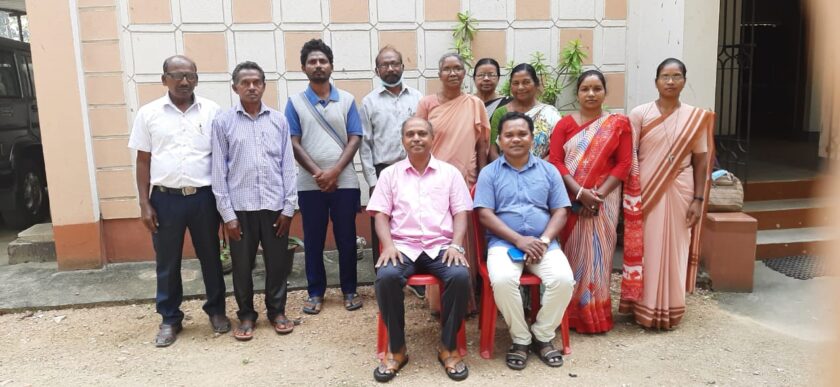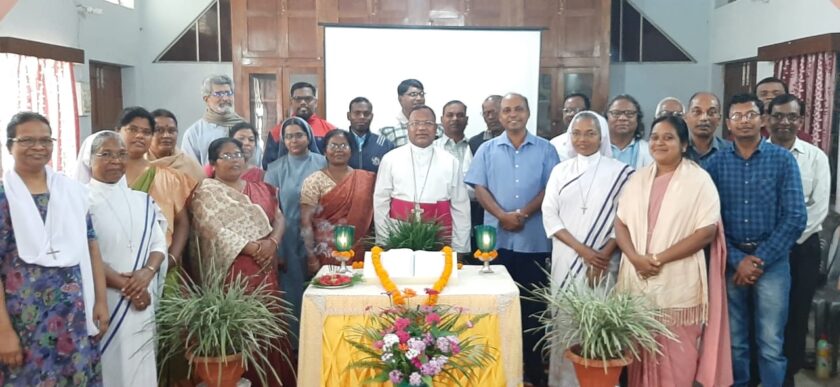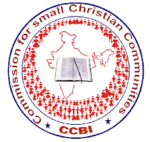REGIONAL CHAIRMAN
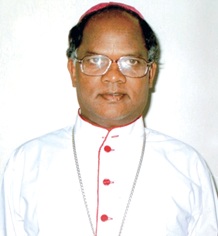
Bishop Julius Marandi
Bishop Of Dumka
Bishop’s House, Dudhani, Dumka Post & Dt. 814 101. Jharkhand
Mobile No: 9431156012
Email : [email protected]
Regional Secretary: To be appointed
Bishop’s House, Dudhani, P.O. Dist. Dumka -814101
| SL No | Diocese | Name of Secretary | Address | Mobile/Email | Full Time/Part Time/Contact Person |
| 1 | Dumka | Fr. Suban Marandi
|
Pastoral Central, Guhiajori
P.O Guhiajori Dist Dumka, Jharkhand
|
Mobile No. 7294864401 | Full Time |
| 2 | Hazaribag | Sr. Neelam Xess HC
|
Bishop’s House
Diocesan Training Centre Julu Park, P.O No. 14 Hazaribag – 825301, Jharkhand
|
Mob. 9471318825 | Full Time |
| 3 | Simdega | Fr. Edmond Bara
|
Catholic Church, Dumardih
P.O. Dumardih P.S Kurdeg Dist. Simdega, Jharkhand
|
Mobile No. 8825142266 | Full Time |
| 4 | Jamshedpur | Fr. Anil Dangh, SJ
|
Director of Divya Bharti
Diocesan Pastoral Centre Near Mundhra Hospital833201 Chaibasa West Singhbhum, |
[email protected] | Full Time |
| 5 | Ranchi | Sr. Cicilia Bara, DSA
|
St. Anne’s Inter College
Mandar P.O Mandar, 835214 Dist. Ranchi, Jharkhand
|
Mob. No. 8709037390 | Full Time |
| 6 | Gumla | Fr. Alex, Pillar Fathers
|
Cath. Church Agharma
P.o. Agharma P.S. Kolebira Dist. Simdega, 835211
|
Mob. No. 9631010226 | Full Time |
| 7 | Daltenganj | Fr. Nepolian
|
Bishop’s House, Station Road
Daltengan .P.O., Palamu Dist. Jharkand – 822101 |
Mobile no. 7543009011
|
Full Time |
| 8 | Port Blair | Fr. Zakarius
|
Bishop’s House
Deepti Dham 231- MG Road, Lambaline P B -466, Juglighat P.O. Port Blair , Andaman & Nichobar -744103 |
Mobile no. 9476079471
|
Full Time |
MESSAGE FOR SMALL CHRISTIAN COMMUNITY
FROM THE REGIONAL SCC CHAIRMAN BISHOP JULIUS MARANDI, BISHOP OF DUMKA
Vatican II has opened the Church to the world and so it is a great gift from God to his people. We see the Holy Spirit working through the Council Fathers during Vatican II and the same Spirit, who formed the small Christian community on the Pentecost, continues to inspire the leaders of the Church throughout the ages and strengthens the Church. Acknowledging Small Christian community as a fruit of Vatican II and a gift from the Holy Spirit to renew the face of the Church today, the FABC, CBCI and CCBI have recommended that in Asia and in India each Diocese and each Parish be a ‘Communion of Communities’ through BCC/SCC.
Indeed the Small Christian community is the need of the hour in the Catholic Church today because it leads us into the process of a New Way of Being Church.
We the Bishops of JHARKHAND-ANDAMAN have taken seriously the promotion of SCC in our Region.
I am grateful to God for the fruits, produced by SCCs – the new way of being Church – in our Region and for the abundance of fruits it will continue to produce in the future.
May God bless all our people and animators who promote Small Christian Community in our Region.
+ Julius Marandi,
Bishop of Dumka,
Regional Chairman of SCC
Jharkhand-Andaman Region
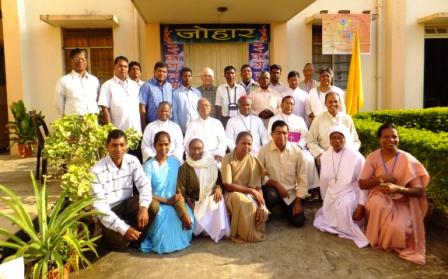
Jharkhand Regional Resource Team (RRT)

Jharkhand Regional Council
PRESENT SCC SITUATION IN THE REGION
| No. | Diocese | No. of parishes | No. of parishes with SCC | No. of SCCs | No. of Parish Teams | Name of Diocesan Coordinators | Name of the Bishops |
| 1 | Daltanganj | 23 | 11 | 45 | 6 | Fr. Rajender Tirkey | Most Rev, Anand Jojo Administrator |
| 2 | Dumka | 50 | 40 | 410 | 15 | Fr. Christopher Hembrom | Most Rev. Julius Marandi |
| 3 | Hazaribag | 28 | 11 | 137 | 9 | Sr. Neelam Xess, H.C | Most Rev. Anand Jojo |
| 4 | Jamshedpur | 35 | 10 | 54 | 5 | Fr. Cyril Tigga, SJ | Most rev. Felix Toppo, SJ |
| 5 | Khunti | 21 | 11 | 39 | 6 | Sr. Roshni, OSU | Most Rev. Binay Kandulna |
| 6 | Simdega | 28 | – | – | – | Fr. Honorius Xaxa | Most Rev. Vincent Barwa |
| 7 | Gumala | 32 | 4 | 35 | Most Rev. Paul Alois Lakra | ||
| 8 | Ranchi | 32 | His Eminence Telesphore P. Cardinal Toppo | ||||
| 9 | Andaman | 13 | – | 400 | Fr. Zakarias | Most Rev. Aleixo das Neves Dias, SFX | |
| Total | 262 | 83 | 1120 |
HISTORY OF BCC/SCC IN BIJHAN
Several individuals, prompted by the renewing action of the spirit of God for the “New way of Being church”, have attempted to promote BCC/SCC in the BIJHAN Region. And so we could say that Basic Christian communities (BCCs) or as some Call it, Small Christian Communities (SCCs) had existed with varying degrees of success in some dioceses of the Region. In 1990 and in 1993 Bp. Oswald Hirmer, the founder of Lumko method, conducted two training programs for BCC, in Manresa, Ranchi. People from West Bengal, Orissa and BIJHAN region attended the training.
In 1993 Father Sebastian Kanedkattil SJ, (then head of the Faith Formation Department of “Navjyoti Niketan” Patna) along with Sr. Christin, H.C (then Staff of “Navjyoti Niketan” Patna), after her studies in Manila on participatory Church, visited the whole Region to study the possibilities of planting BCC/SCC in the Region. Encouraged by the positive response, they conducted two training programmes for the whole region in 1995 and 1996 . These were well attended as over 150 participants took part in each of these trainings. To help the animators to conduct similar programs in the dioceses, they prepared a handbook called, “Naya Akash, Nai Prithavi”, the first ever published book in Hindi on BCC/SCC.
Since then, people like Fr. Mathew Chemplany,SJ, Fr. Ozzie Saldanha SJ, FR. Deepak SJ, Fr. Philip Katakayam and several others tried to conduct training programs at various levels. Fr. Vijay Thomas, the present Secretary of NST, was also called in several times in different dioceses mainly Dumka and Bhagalpur. But only few dioceses like Hazaribag, Muzaffarpur, Dumka, Bhagalpur and Gumla did work on grass root level.
THE FIRST BCC/SCC REGIONAL COUNCIL MEETING:
The SCC Chairman Bishop Julius Marandi of Dumka, Bishop Charles Soreng then Bishop of Hazaribag, and Sr. Christin, HC, National Service Team (NST) reflected on the challenges and the need for a coordinated effort for promoting BCCs/SCCs in the Region. As a result a two-day meeting of BIJHAN Regional Small Christian communities was held at SDC, Ranchi, from June 26th to 27th 2007. Out of the 15 dioceses of the Region invited, only 8 dioceses were represented. The dioceses present were: Bhagalpur, Dumka, Gumla, Hazaribag, Jamshedpru, Rachi, Simdega and Patna. The reason for the absence of the remaining dioceses was seen as the unforeseen bandh called by MCC on 26th and 27th of June.
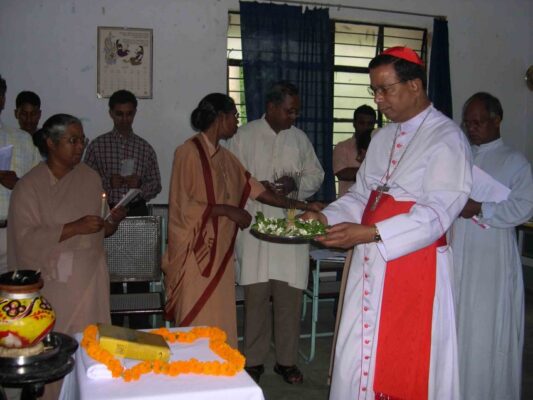
Inaugurating SCC Regional Council June 26th 2007
At the inaugural session of this meeting, Cardinal Telesphore Toppo shared his experience of witnessing a participatory Church in Bokaro Steel City Parish. He congratulated Bishop Charles for making the parish a participatory church where the parish has ceased to be a parish of individual Christians and has grown into a caring and sharing community “a Communion of communities”. He said: “There has to be a deep sense of gratitude to God, because we receive everything from him. When the word of God permeates the whole of our lives we become a sharing and caring community and we grow in love and faith”.
THE FIRST BIJHAN REGIONAL SERVICE TEAM MEETING
On 29th June, 2009 the BIJHAN Regional Service Team, along with Bishop Julius Marandi, met at Seva Kendra, Kolkata and formulated a vision/mission for the Region.
VISION:
Nourished by the living word of God Catholic communities witness to God’s reign to all in BIJHAN region.
MISSION:
To build and strengthen Small Christian Communities in every parish to witness to Christ and transform the BIJHAN region.
OBJECTIVES:
To help the people to grow in greater love and appreciation for the Word of God.
To encourage the daily reading of the Word of God in the families.
To encourage the daily reading of the word of god among the students.
To train animators in the parish/deanery/diocesan level for BCC/SCCs.
To conduct motivation programs for bishops, priests and religious on SCC.
To collaborate with those who work for human and Christian values.
To promote meaningful communitarian celebrations of the liturgy and sacraments.
To promote love and harmony in the neighbourhood among the people of all faiths.
To procure teaching aids and resource materials for BCC/SCC animation.
To integrate BCC/SCCs into parish operational system.
To work for the empowerment of the marginalized and oppressed.

TELESPHORE P. CARDINAL TOPPO (ARCHBISHOP OF RANCHI)
Positive experiences of the Basic (Small) Christian Communities:
- BCC/SCCs have become instruments of Evangelization. BCC/SCC give witness of a sharing, caring, forgiving and serving community. This has inspired a number of people of other faiths to ask for baptism and to have membership in such a community.
- Sunday Church attendance and participation in other Church activities have gone up. It was noticed in some parishes where Catholics who had left the Church started coming back with the starting of BCC/SCCs in the parish.
- BCC/SCCs have become instruments of faith formation and family catechesis. Through SCCs family counseling (When the couple fight); family prayers; family reconciliation and the care of the children are promoted.
- BCC/SCCs have become seed bed of a New Society.
- There is a growth in the awareness that “we are the Church” and “we are the body of Christ” and we are responsible for one another.
- The love for the Word of God and the desire to live by it is increasing.
- The BCC/SCCs are gaining support as the new way of being Church. This support is coming more forcefully from the laity.
- The BCC/SCCs have definitely increased the participation and involvement of the laity in the works of the parish. And as a consequence people are becoming more aware of what it means to be a Christian.
- The BCC/SCC leaders visit families regularly and communicate the compassionate love of Jesus visible.
- BCC/SCCs help families to take the Bible as their light for life and read together passages and search for light for their lives.
- BCC/SCCs make sure that every family gives importance to family prayer and pray together devotedly.
- BCC/SCCs help the parents to take up their responsibility for being the primary catechists of their children through their own examples and the interest taken in the faith formation of their children.
- There are BCC/SCCs that have helped their members withdraw court cases pending against each other for 18 years between father and son;
- BCC/SCCs have rescued woman accused of being witch;
- BCC/SCCs have settled land cases;
- BCC/SCCs have been helping to reconstruct houses of poor people destroyed in the storm and rain; planting 2000 trees to protect environment;
- BCC/SCCs have been running schools for the children of the village and nearby villages;
- BCC/SCC leaders of the parish have been meeting MCC leaders threatening the Parish priest to settle the matter through dialogue etc.
DUMKA DIOCESE

Bishop Julius Marandi

Diocesan Coordinator
Fr. Dominic Marandi
Mob. 08539092812
REVIEW SEMINAR TO COMMEMORATE THE GOLDEN JUBILEEOF VATICAN II AND SILVER JUBILEE OF THE FABC BANDUNG STATEMENT OF 1990
A review Seminar was held at St. Joseph’s School, Dumka, Jharkhand, from 16 to 19, Sept, 2015 to commemorate the golden jubilee of Vatican II and Silver Jubilee of the IV FABC Plenary Assembly in Bandung in the year 1990. Approximately 600 participants (3 Bishops, priests, religious, laity and SCC animators) from about 16 districts of Eastern India from four Eastern States attended the seminar entitled “New Way of being Church in India”. The fifth Plenary Assembly of FABC held in1990 in Bandung, in its final statement, said: “The Church in Asia will have to be a Communion of Communities, where laity, religious and priests recognize and accept each other as sisters and brothers”. This fifth FABC Assembly has made significant contribution to the development and growth of the spiritual, liturgical, cultural and theological life of Small Christian Communities (SCC) in India.
The review seminar was inaugurated with flag hoisting by Bishop Clement Tirkey of Jalpaiguri, Solemn Mass by Bishop Julius Marandi of Dumka (Chairman of SCC in Jharkhand and Andaman Region) and Bible enthronement by Bishop Cyprian Monis of Asansol Diocese, and lighting of the traditional (or ceremonial) oil lamp by all 3 Bishops and Sr. Christin (NST Member). This review seminar thanked God for Vatican II and revisited the IV FABC Bandung Assembly and its statement on SCC to see how it has enabled the dynamic growth of Neighbourhood Church in the Santhal belt in Eastern India. “The Small Christian Communities (SCCs),” said Bishop Julius the Chairman of SCC in Jharkhand and Andaman Region in his Key note address, “have become most effective instrument and space to deepen, live and witness Christian faith in Santhal Region. The SCCs have the power to transform the Santhal community to a reconciling and bridge building community through a life of love. Living a life of love is an authentic living of Christian faith. A genuine life of love reaches out in service and becomes a source of transformation of society. SCCs are the primary means of national integration, upholding truth, honesty, justice, human rights and dignity, justice in our society. SCC is the only means of development and restoration of our culture and uplifting traditions in the Santhal community.”
The 1st, 2nd and 4th day of this four-day event was held in the pandal in front of the St. Joseph School, Dumka, while the 3rd day afternoon was a mega Bible Rally, starting from the Pandal to the Cathedral of Dumka diocese. The program for the first two and a half days consisted of Community Prayers, Talks and power point presentations by different Speakers, Testimonies, Cultural Exchanges, Eucharistic celebrations, Bible veneration, Gospel sharing and Eucharistic adoration.
The Bible Rally in the afternoon of the third day, the first of its kind in the Region, participated by above 8000 people in their Santhal traditional dress, dance and music, was a very inspirational and memorable event. The Rally was concluded with a Solemn Eucharistic celebration.
“SCC is a grass root movement of the Church”, said Bishop Clement of Jalpaiguri, the main Celebrant of the Eucharistic celebration during the homily, “that endeavors to build caring and serving neighbourhood communities like the early Christian communities. This grassroots Community building movement of the early Church sprang up again in the sixties in different parts of the world after the Second Vatican Council with a renewed understanding of the Church as a Communion of Communities. It is essentially a movement involving all the faithful and aiming at their empowerment, renewal and committed involvement in the building of a just, fraternal and peaceful Society.”
The topics of presentations during 1st and 2nd day of the seminar were:
1. Salient features of the FABC Vision of the New Way of Being Church and on the promotion of SCC;
2. Impact of the FABC Vision in furthering the Vatican II vision of the Church in India”;
3. How SCCs helped people to respond to the Social doctrines of the Church
4. Authentic path to New Ecclesial Spirituality as projected in the FABC Vision of the New Way of Being Church
5. Emergence of New Pastoral Structures in the Church in India in the light of the FABC Vision.
Presentation on these topics were followed up by group discussions, thus making the seminar truly participatory in nature.
The main organizers of the programme were Frs. Christopher Hembrum and Sonaton Kisku of Dumka, along with Sr. Christin, HC of Calcutta and Fr. I.P Sarto of Asansol diocese. A local organizing committee of Dumka has been planning for this great event for the last six months with various committees meeting regularly.
The preparation for this mega event began 3 months back with the formation of the local Organizing Team. The Local Diocesan Organizing Team worked tirelessly to make this event a grand success.
Being the first of its kind, this event presented a unique opportunity, not only as a Faith Experience but also as an experience of growth in leadership and a keen awareness of the Cultural and Religious heritage of the Church in Dumka.
GUMLA

Bishop Paul Alois Lakra

Fr. Alex Kindo SFX
Gumla Diocese was created in 1993. In 1995 under the leadership of Bp. Michael Minj SCC was introduced in Gumla by Sr. Christin, H.C and Fr. Sebastian Kanekattil, SJ, the faith formation team of Navjyoti Niketan Patna, Regional Pastoral Center. It was promoted with great enthusiasm unti year 2003. In the year 2003 Bishop Michael Minj left for his eternal reward. The SCC movement then suffered and growth slowed down.
Agharma Parish : 69 SCCs
Dalmadi Parish: 35 SCCs
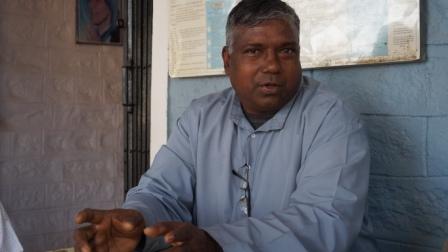
Fr. Alex coordinates the SCCs in Agharma Parish. There are 69 SCCs in the Parish managed by Pillar Fathers

Fr. Habil Minj the Parish priest encourages SCCs in the Parish
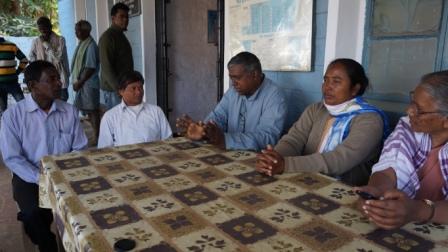
The SCC team led by Sr. Christin visited the parish to learn the SCC situation in the parish
SCC in the parish started in the year 2011. SCC meetings are conducted every week regularly. Parish level SCC seminars are conducted by Fr. Alex and team. Fr. Alex has received training in Navjyoti Niketan, Patna facilitated by Sr. Christin, H.C and team. Since SCC started every family has a Bible and people are growing in love for the Word of God. Dalmadi Parish SCCs are manimated by Dominican Sisters.
HAZARIBAG DIOCESE

Bishop Anand Jojo
SCC Diocesan Coordinator

Fr. Vijay Horo
Mobile: 9608855859
Email: [email protected]
KHUNTI
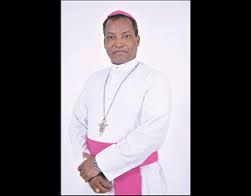
Bishop Binay Khandulna

Diocesan Coordinator
Sr. Roshni Baxla OSU
RANCHI

Cardinal Telsophore Toppo

Auxiliary Bishop Telesphore Bilung
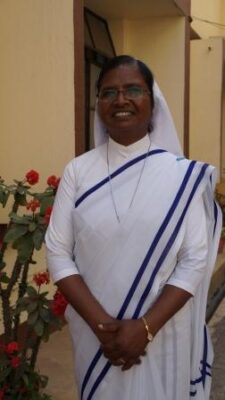
Diocesan Coordinator
Sr. Soshan DSA
True Stories:
Dumka Diocese
Chechali is a Santhal village in Madhupur parish of Dumka Diocese in Madhpur (Dt), Jharkhand. The people in the village (50 families) were living in total misery and starvation. They had no means of livelihood except farming and cultivation. They had no forest nearby to collect the fruits, seeds and other means of income, and there were no factories to get a job. There was problem of water for cultivation and they had no means of irrigation. If they were fortunate they got rain once a year during monsoon. They depended on this rain for farming and cultivation. People fought among themselves out of jealousy, superstitions and hatred.
In the month of May, 2008, Madhpur Parish arranged a SCC awareness programme for the people of the parish. 20 Catholic families from this village attended the program. They were inspired by the exercises and the Word of God, especially, Isaiah 55: 10 -12 “For as the rain and the snow come down from heaven, and do not return there without watering the earth and making it bear and sprout, and furnishing seed to the sower and bread to the eater; so will My word be which goes forth from My mouth; It will not return to Me empty, without accomplishing what I desire, and without succeeding in the matter for which I sent it. For you will go out with joy and be led forth with peace; the mountains and the hills will break forth into shouts of joy before you, and all the trees of the field will clap their hands.…” Inspired and empowered by the Word of God, they decided to change their situation in the village.
They began SCC in their village and named it St. Monica SCC. Their regular meeting and Gospel sharing brought unity among them and bound them as a community. In the month of June 2008, in their Gospel sharing they were challenged by the Word of God, “
I have come in order that you might have life – life in all its fullness.” John 10/10. They asked themselves if the Lord came to give us fullness of life why are we starving and living in poverty and misery. So far they were cultivating their land individually. They spent their time protecting it from animals and other people. So they decided to do farming collectively and help widows and other helpless people to cultivate their land. They welcomed whole heartedly this idea which emerged from among them.
Challenged by the Word of God the SCC members started collective farming. When an NGO called Lok Jagriti Kendra heard about the collective farming, they offered the SCC members a pump set free to help them for irrigating their farm. This made their work easier.
In the next SCC meeting they were informed by one of the members that there is a fund available called “Mukhya fund” for the people who do collective farming in the village and they could have instruction for farming and better seeds for cultivation from the Block. The SCC members decided to go together to the Block Development Officer to request for these helps available. To their great joy they were rewarded and help was made available. Now the SCC members included all 50 families of the village saying. “We the SCC (the neighbourhood Church) will see that we have no one in our village, going to bed hungry.”
Mr. Jerome Tudu the animator says, “I am reminded of the multiplication of 5 loaves and 2 fishes. The Lord has done miracles in our village with the power of His word.”
Another villager says. “the Word of God instills confidence within us”.
Mariam Handsak says, “ We need not buy anything from the market now except oil and Masala”
John Murmu says, “ The Lord rewarded us in abundance for the little work we have done”
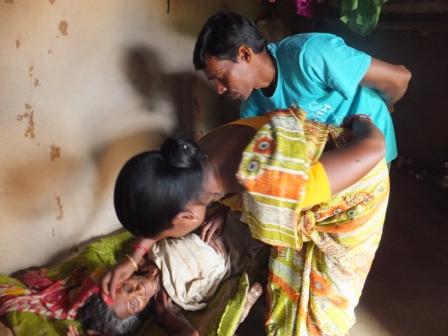
The unity and love among the members of SCC instilled confidence in Shanti Devi, a Hindu widow. She approach them for help in the unjust treatment she was getting from some people in the village. Shanti Devi was accused of being a witch and was put out of the village because some powerful people of the village wanted to grab her property. The SCC members of the parish took up her cause. They called for a village meeting. During the meeting the SCC members made the Hindu brothers and sisters understand that it was not right to put the poor, helpless widow out of the village. They made it clear to the villagers that injustice to a poor voiceless woman is a great crime. They even quoted from the Hindu scriptures to show that it was a sin to deprive the woman of her property and throw her out in the street to die. The SCC members then, with the help of others, built a house for the poor widow and sheltered her in her own land. The SCC families took care of her needs till her death in the year 2014.
What is the most significant change the people experienced?
- Growth in their faith and trust in God
- Growth in faith in the Power of the Word of God
- Love for the Word of God
- Sense of being Church in the Neighbourhood
- Growth in Self Confidence and in a sense of Dignity
- Unity and oneness among them
- Growth in the sense of belonging to one another
- Growth in the sense of belonging to the human family
- Ability to rise above one’s caste, creed; with a sense of universal oneness
- Growth in leadership qualities
- Better knowledge of farming
- Better standard of living
- Eradication of poverty from the village
Khunti Diocese
In the Jharkand Region SCCs have been making efforts to build bridges between Christian communities and neighbours of other faith, mainly “Sarnaism.” Many of our tribal Christians in Jharkhand belonged to “Sarnaism” before they were converted to Christianity. Therefore, there is, now and then, conflict between these two groups, mainly about their festivals and participation in the festivals. Fr. Vijay Ekka is a trained SCC animator who works among the Munda tribe in a Parish of Khunti diocese. Munda people follow their own indigenous Indian religion referred to as Sarnaism. Sarnaism professes belief in a god called Singbonga. Singbonga, the God of Mundas, is neither the sun nor a god that would dwell in the sun, though he is in the Heaven of Sarnaism. In primordial times, the creator was called Haram and the same Haram is also known as Singbonga , who is the god of the Mundas. He is eternal, omnipresent, omniscient and omnipotent. In sacrifices, he is commonly praised as the one who separated land and sea, set the course of sun and moon, and created man. Haram is referred to as god, who provides all good, while Singbonga is often related to worship.
However, with the arrival of British colonialism to Jharkhand came Christian missionaries and the “tribals” accepted Christianity beginning in 1845. One-fourth of the Mundas were converted to Christianity.
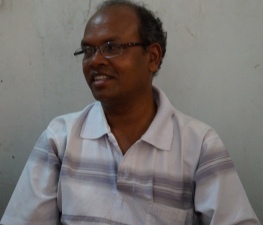
Father Vijay Ekka
As a parish priest Fr. Vijay Ekka makes effort to fill the gap between the Christians and Sarna brothers and sisters. He makes a clear distinction between what belongs to religion and faith and what belongs to culture and social customs. He lets the people celebrate social, national and cultural festivals with people of other faith and allows Pahaan Munda (this is the status of a priestly class among Munda people. Pahaan Munda is one of the learned men among the tribals who has knowledge to overcome social troubles & cure various diseases. He is believed to have spiritual powers which he utilizes for the welfare of his people.) and other leaders to carry out the rituals which are cultural and social while he officiates the religious functions. This makes the leaders of Sarnaism feel happy and accepted. According to Fr. Vijay Ekka this acceptance from his part has made them come closer to Christian Community.
SCC IN JHARKHAND
(From the 45 years of studies, observation and experience of working, sharing and living with tribal brothers and sisters in Jharkhand)
Planting SCC in the soil of Jharkhand is not an easy thing to do. Often the clergy is of the opinion that Adivasis do not need SCC as they have already Small Communities in their villages. What more can SCCs offer to the Adivasis of Jharkhand?
To understand the need for SCCs in Jharkhand Region we need to know the situation of Jharkhand not just superficially, but in a deeper way.
- A short Introduction to Jharkhand
The Jharkhand state was formed on 15 November 2000, carving 18 districts out of Bihar.
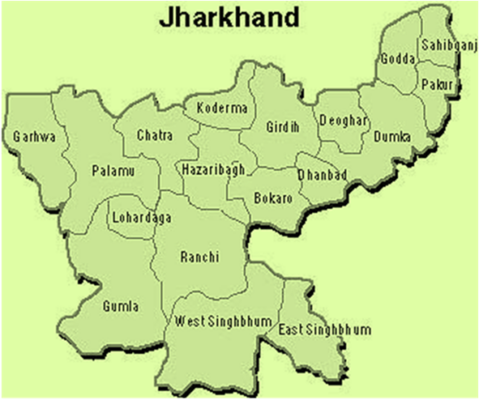
The state is well known for two things
1. its abundant mineral wealth
2. its multicolored tribal population.
The people of Chotanagpur (Jharkhand) are the Adivasis. Thirty types of tribes inhabit Jharkhand.The major Adivasi groups are of Santal, Ho, Kharia, Munda and Oraon Population.
The thirty tribes of Jharkhand were categorised by Vidyarthi (1958) in the following manner:-
Hunter-gatherers – Birhor, Korwa, Parhaiya etc.
Shifting Cultivators – Sauria Paharia, Mal Paharia, Birjia, Asur etc.
Simple Artisans – Mahli, Chik Baraik, Lohra, Karmali etc.
Settled Agriculturists – Santhal, Munda, Oraon, Ho, Kharia, Kharwar, etc.
The major Adivasi populations (91.7 percent) reside in villages and merely 8.3 percent have shifted to the urban areas. Due to rapid industrialization the population of the adivasis is declining.

- Tribal Spirituality:
The adivasis have a deep sense of spirituality. They have a deep awareness of God’s presence everywhere, they connect their daily life of hard work with worship, they care for all creation and they have a high standard of morality. The tribals connect with God through worship, adoration, sacrifice and offering, prayer and penance, self purification and good work. Offering sacrifice is quite natural to them. Their sense of humility, simplicity, poverty, hard work, sincerity, community spirit, sharing and caring comes from the deep inner spiritual life.
B.1: Prayer:
The tribal prayers are basically prayers of petitions. Their contact with God is not limited to great occasions and events. They frequently contact God in their daily life. In social gatherings and meetings God is called upon to witness the occasion by being present. God is called upon not only to get favors but in order to be present to witness and to approve their ritual actions, meetings etc.
- Sacrifice and offering:
Sacrifice and offering is followed by a meal prepared by using those things used for the sacrifice. On the previous day of any common sacrifice for the whole village the pahan and pujari keeps fast. A santal priest sleeps on the ground rather than on bed. Fast and abstinence are most common among the tribals. - Tribal Social Life:
C.1. Nothing is wasted:
The tribals of Jharkhand have a keen sense of poverty They see that nothing, not even a grain, is wasted while distributing food, taking meals, while cutting paddy. They are picked up and kept in right containers or used in the right way. Children are told ; do not waste food; it is not cultivated in the head of a dog, meaning it is earned with hard labour.
C.2.Communitarian and democratic life:
Decision making process is very democratic. All are ready to obey a decision made by the whole community
C.3.Co-responsibility:
In the tribal family all are responsible for the education of the child. They have the right to teach, correct, reprimand and punish the child.
C.4. Democratic and Hierarchical:
In the village level tribal life is democratic but in the family level it is hierarchical. Authority is with parents and elders, not with children.
C.5. Community Spirit:
The tribals in Jharkhand have a deep sense of community living. This is shown in their work and celebrations.
C.6. Community celebration:
All the social gatherings, religious and social festivals, especially the celebration of marriage, show a great deal of community solidarity. This is expressed in common feasting, singing, dancing, drinking, helping one another. They sacrifice their own time and energy in voluntary service on such occasions.
C.7. Hard working:
Tribals are hard working people as their livelihood depends on ceaseless hard work and labour. Hard work and is a highly valued quality in the tribal society. In marriage, one of the most looked for quality in the partner, especially in the girl, is hard work.
C.8. Sharing and caring:
Another beautiful value in the tribal community is sharing the good things with neighbours. When they prepare a different curry than usual, be it of edible leaves collected from the fields or forests, pluses, meat or fish, they share it with their neighbors. What is important here is not the taste of the curry itself but the joy of giving and sharing from the very little they have. Drinking of rice beer is done in community, to express joy and communion with one another. It is rarely done alone. They share with the needy their utensils, grinding stone, ladder, husking machines etc.
C.9. Concern for others:
The feeling of solidarity and concern for the sick, the sorrowful is very high. When someone dies in a family, for a week people from the village visit the family to talk to them about the deceased and to condole them.
C.10. Welcome and Hospitality:
Tribals have a warm way of welcoming their guests, often by washing their feet when they arrive. This washing of the feet has been done traditionally by mother of the family; someone dear and loving to the guests. Washing of the feet is a mark of welcome from the heart, special love, respect and acceptance. After this warm welcome they exchange news and a little food and drink.
C.11. Greeting one another:
Greeting one another when they meet and take leave is very important. It is not a gesture acknowledgment alone but also an expression of deep gratitude for the one who is greeted.
- Resources in Jharkhand:
D.1. Minerals:
Jharkhand goes through unending struggle for mineral resources as the state contains 40 percent of India’s precious minerals like Uranium, Mica, Bauxite, Granite, Gold, Silver, Graphite, Magnetite, Dolomite, Fireclay, Quartz, Fieldspar, Coal, Iron and Copper.
D.2. Forests:
Forests and woodlands occupy more than 29% of the state which is amongst the highest in India. Jharkhand is a land of hills and forests, rivers and plains, ravines and passes, wild animals and domesticated cattle.
- The People’s Struggles:
E.1.Industrialization:
The people of Jharkhand have to go through exploitation and injustice by the state. The government, the Industrialists and the Media are putting hard efforts to convince the people by propagating the message that industrialization is the only way to develop the young Jharkhand state. Therefore the villagers must surrender their land for the development projects, which would provide them jobs, infrastructure and boost the economy of the state. But the Adivasis are not convinced with the ideas as 91.7 percent of them still rely on agriculture, forest produces and livestock for their survival.
E.2.Displacement:
There has been turmoil against displacement in the state. The corporate houses are attempting to enter into the region through the back doors. They are playing many tricks and also luring people with the huge monetary packages for acquiring land.
E.3. Adverse effect of modern development processes
The people of Jharkhand, especially the Adivasis, have been undergoing the adverse effects of the unjust modern development processes for more than a century. Hence, another mass movement against the Arcelor Mittal Company began in 2005 in the region under the banner of “Adivasi-Moolvasi Astitava Raksha Manch”. The people are resisting industrialization of the region and are not ready to give even one inch of their remaining lands. They have declared that “they need grains, not iron, for feeding their stomach”.
The Adivasis’ struggle against displacement has spread across the state. “Loha Nahi Anaj Chahiye” (We want grains not iron), “Jal, Jungle aur Jamin Hamara Hai” (Land, forest and water belong to us) and “Jan denge, Jamin Nahi Denge” (We will surrender our lives but not land), are a few overwhelming slogans being raised from villages to the state capital. A series of mass meetings, road blocks and Rallies are being organized in these areas, where thousands of Adivasis and local people participate, shout slogans and echo their voices. The message they want to convey to the government, the industrialists and the middle class is that ‘they won’t give up agriculture land for the development projects.
There are some prominent organizations of the Adivasis like Bisthapan Virodhi Ekta Manch, Adivasi Moolvasi Astitva Raksha Manch, Jharkhand Ulgulan Manch, Creaj Jan Mukti Andolan, Jharkhand Mines Area Coordination Committee and Jharkhand Indigenous People’s Forum, who play crucial role in the anti displacement movement in Jharkhand.
E.4.Facing betrayals:
The people were betrayed in the name of rehabilitation, compensation and jobs. The promises were not fulfilled and the jobs were given to the outsiders. In the present era, the companies mostly use technologies that reduce job opportunities, and so job security has declined.
The Adivasis had the ownership rights to the natural resources and they prudently used these resources for their survival.
E.5. Protection of Adivasis Rights
There are numerous laws made for protection of the Adivasis’ rights but these laws were never enacted honestly.
The government of India was unable to bring a law for the rehabilitation of the affected people even after the 62 years of independence, but legislation for the Special Economic Zone (SEZ) was passed immediately.
This is why the intention of the state was always questioned and the people are resisting displacement everywhere. The people were displaced from one place to another in the name of development but they were not rehabilitated. Hence they feel that they were betrayed in the name of “development” and “national interest”. Therefore now the Adivasis believe that they can protect their land only through mass struggle.
The life cycle of the Adivasis is based on the natural resources, therefore their co-existence with nature cannot be questioned. Hence, it is the need of the hour to rethink on the present development model. The unjust development process cannot be carried on as the Adivasis also have similar rights to life with dignity, freedom and equality guaranteed by the constitution of India.

- SCCs as a Response to these Challenges in Jharkhand
F.1. Becoming a local/Neighbourhood Church
Jharkhand SCCs are often thought of as “foreign” by some clergy in Jharkhand. Becoming truly local churches is the challenge. Faced with growing communalism and fundamentalism, SCCs are challenged to shed their image of being “foreign implants” and to become communities which feel at home, and which are accepted by the other communities in the neighbourhood as full-fledged and respected members of society. “The building up of a local church, the neighbourhood Church” is a never-ending process of “becoming a local/neighbourhood church.” It means that the Gospel is meeting a living group of people in every moment of their life struggles in their history. The significance and importance of SCC lies in the fact that all the members of such a community are involved in building the church, realizing it in their concrete life-situations.
F.2. Attitude of Listening
In working with SCCs of Jharkhand tribal communities the attitude of listening and being with the community is very much needed to experience Church as a communion where all members are called to participation and co-responsibility.
A dialogical process of inculturation happens here in communities of Jharkhand where people live their common-life-situations in the midst of the present tribal reality. The process of inculturation starts at the grassroots level, in a constant dialogue of life with religions, cultures, and the poor. SCCs need the help of experts — through the theological, ethnological, anthropological sciences, to find out the compatibility of the process and end results with the living Tradition of the Church.
F.3 SCC response to People’s Struggle
The SCC animators and Coordinators and their trainers are aware of the rich tribal spirituality, culture and their struggles. The animators are called upon to protect the rich heritage of the people and to help people to face life in the light of the Gospel. SCCs in Jharkhand being “ Neighbourhood Church” are affected by the struggle against land grabbing, displacement, unjust modern development processes, exploitation and injustice.
The challenge for SCCs ‘the neighbourhood churches´—and, for that matter, for the church in India, is to develop a distinctive form of Christian living of the gospel and of being church. This will be a wonderful contribution towards a true universality of the Christian faith in a communion of Communities, living different forms of Christian life in “unity in diversity.”
“He who has an ear, let him hear what the Spirit says to the churches” (Rev 2:7). To respond to the challenges posed by the political, economic, social, religious, and cultural situation within Asian societies, the bishops, priests, religious, and lay people have to discern the “signs of the times and to interpret them in the light of the gospel.” This task implies that the Church “recognize and understand the world in which we live, its expectations, its longings, and its often dramatic characteristics” (GS 4).
Being in the service of justice, liberation, and emancipation, and community building, is one of the foremost challenges to SCC animators in Jharkhand. The theology of inculturation has been criticized and declared to be a “spent force” (Felix Wilfred), because with its focus on culture—and for that matter often the high culture of the ruling class—it does not include the reality of the exploited and suffering people. Based on a deeper understanding of the mystery of the incarnation, SCC animators are challenged to express Christ’s identification with the least and downtrodden, in the service of justice.
Sr. Christin, H.C
Sisters of Mercy of the Holy Cross,
NST Member represents NST in Jharkhand
GOLDEN JUBILLE OF VATICAN II & SILVER JUBILEE OF THE FABC 5TH PLENARY ASSEMBLY STATEMENT 1990
REVIEW SEMINAR ON THE NEW WAY OF BEING CHURCH IN INDIA
For Santal SCCs in Dumka
17th to 19th September 2015


For the Concluding Bible Procession and Mass of the Review Seminar 8000 Santhali Speaking SCC members were present in the Santal Costumes.
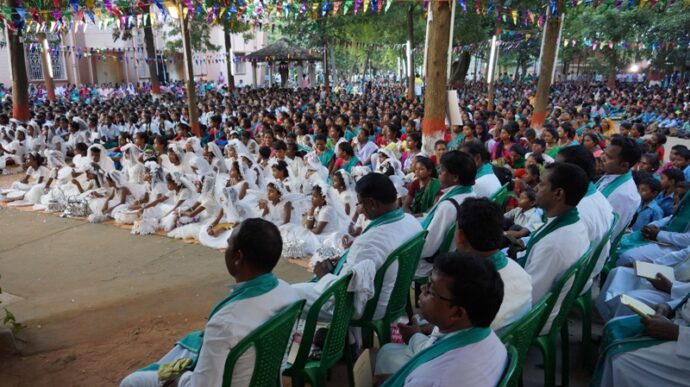
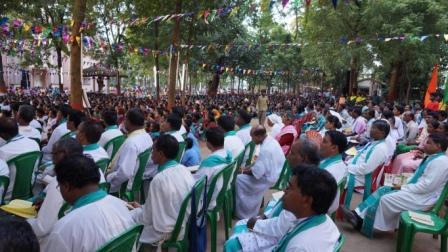
9th SCC Regional Council Meeting
Bishop House, Hazaribag
2/12/2015 to 4/12/2015

Regional Council Meeting was inaugurated by flag Hoisting by Bishop Anand Jojo, Bishop of Hazaribag
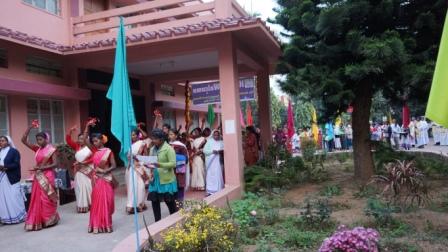
SCC Regional Council meeting inaugural Bible procession

Bible Veneration during SCC Reional Council meeting

Fr. Sebaastian Kanekattil SJ, taking session on “LAUDATO SI” … PRAISE BE TO YOU!
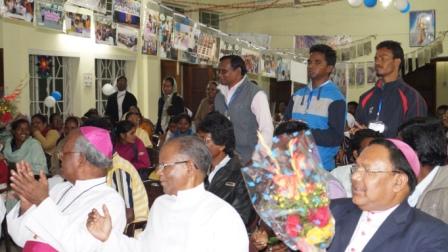

Concluding Mass during the Regional Council Meeting, in Hazaribag
REPORT OF THE REVIEW SEMINAR IN HAZARIBAG
The First Review Seminar of the Tribal Region Small Christian Communities (SCCs) was held in Hazaribag, India, from the 9th to the 12th October, 2016. This Seminar celebrated a triple jubilee: the GOLDEN JUBILLE OF VATICAN II, the SILVER JUBILEE OF THE FABC 5TH PLENARY ASSEMBLY STATEMENT 1990, and the SILVER JUBILEE OF SCC IN JHARKHAND. Seven hundred leaders of SCCs, including 12 bishops and a Cardinal, from 17 dioceses of Jharkhand, Bihar, Orissa, Chattisgarh and West Bengal, were present at this Review Seminar, which had the theme “The New Way Of Being Church”.
Most Rev.Julius Marandi, Bishop of Dumka, Chairman of the Regional SCCs, and Rt. Rev. Anand Jojo, bishop of Hazaribag and Host of the Event, played eloquent roles with their teams to make the Seminar a memorable one for everyone.
The programme for the three days of the Seminar consisted of: meaningful Eucharistic Celebrations, interactive sessions, Bible processions and Veneration, Eucharistic adoration, fraternal fellowship, sharing of success stories from the regions, exhibition on Tribal life and culture (the wisdom of ancestors) and exhibition on SCCs, conferences and book releasing, and a variety of adivasi cultural dances. These did speak to the hearts of everyone present, inviting each one to get convinced that Small Christian Communities can become places of Communion of Faith in Love in the tribal context.
His Eminence, Telesphore Cardinal Toppo, at the Inaugural Eucharistic Celebration, addressed the group saying, “We are here because of God’s plan and with His blessings we have entered into this programme.” He said that God shows us His love through small events and happenings in our lives. Family “the domestic Church” is the joy of love. Therefore SCC is the network of families “the Neighbourhood Church” and is “the network of the joy of love.” Bidding farewell at the end of the programme he said: “Through SCC you are all doing a very good work, and in this work I am with you always. For the world I am a Cardinal but for you, I am yours.”
Most Rev. Thomas D’Souza, Archbishop of Calcutta, at the concluding Eucharistic Celebration, spoke on the need to choose life not death today in our context. The need to constantly discern because at one side God is inviting as to Himself and on the other side the evil forces of death like selfishness and pride. Being self centered we often leave God aside and choose the evil forces. If we choose life and the Holy Spirit we will find Joy in our lives… Through small and humble services St. Theresa of Calcutta from the very beginning chose life. In the Year Of Mercy the Lord is calling us to come to Him and experience Mercy and be Merciful like our Heavenly Father is Merciful.”
Most Rev. Ignatius Mascarenhas, Bishop of Simla-Chandigarah and Chairman of NST, in his message situated the Vision of the Review Seminar in the context of the Vision of Vatican II and that of the FABC V on the New Way of Being Church. He shared and appreciated the many changes brought about by SCCs in India.
Most Rev. Julius Marandi, Bishop of Dumka and Chairman of the Regional Service Team, shared the salient features of the FABC V Vision of the New Way of Being Church. He said that this FABC Pleanery Assembly was a very important mile stone in the history of SCCs in India
Most Rev. Anand Jojo, Bishop of Hazaribag, shared the impact of the FABC vision of the New Way of Being Church in implementing the Vatican II vision in the Church in India. He highlighted the role of laity in the New Way of Being Church.
Most Rev. Binay Khandulna, Bishop of Khunti, reviewed Leadership in the New Way of Being Church and the challenges leaders faced in the forming and sustaining of SCCs.
Dr. Fr. Francis Scaria, Professor, Systematic Theology, Ashta Regional Theologate, presented “The New Way of Being Church – an authentic Path to Vatican II Ecclesial Spirituality as projected in the FABC Vth Vision of the New Way of Being Church”.
Most Rev. Clement Tirkey, Bishop of Jalpaiguri, shared how SCCs helped people to Respond to The Social Doctrine and Issues of Justice in the Church and Society.
Most Rev. Vincent Aind, Bishop of Bagdogra, said: “In the case of Christianity the never ending source of nourishment is the Word of God. The Word of God is active and alive. It continues to touch the lives of many, individuals and communites. It is in this sense that the SCC scores better than the tribal community. As the source of appeal, the source of inspiration and the source of continual support or nourishment the Word of God is the reason why SCC can not only save Christanity, nay humanity; it can also in turn save the Tribal community”.
Fr. Vijay Thomas, Secretary of NST for SCC, shared the Emergence of New Pastoral Structures in the Church in India in the light of the FABC V Vision of the New Way of Being Church.
Tribals of Chotanagpur have a strong sense of community: widows, orphans and handicapped people are cared for, major events of life are always communitarian, fruits and cereals or animals are shared. Decisions are taken as a community and community decisions are obeyed by all. They have a sense of humility, simplicity, poverty, hard work, sincerity, community spirit, sharing and caring coming from a deep inner spiritual life.
Planting SCC in the soil of Chotanagpur tribal belt was not an easy thing. Many people, including the hierarchy at times, were of the opinion that tribals are already a small community in the village and that they did not need Small Christian Communities in the region. SCCs were often looked at as a foreign body which cannot answer to the unique issues they are facing, especially the land grabbing by corporate bodies and anti-tribal policies of the Government. The tribal community lives in fear of losing their land which means losing their identity, and worse still, the extinction of tribal community itself.
At such a situation we wanted to look back at the Vatican II and at the FABC Bandung statement on SCCs and how they have enabled the dynamic growth for the Church in Tribal belt. We wanted the First General Assembly of SCCs of Tribal belt to be a platform to look back on, to reflect and evaluate the implementation of the vision of the Church in the tribal belt of India, particularly focusing on BCCs/SCCs. We wanted the First Assembly of SCCs in Tribal belt to contribute and strengthen us and BCCs/SCCs to move forward towards the periphery in “the Joy of the Gospel (which) fills the hearts and lives of all who encounter Jesus” (EG 1.).
In the Review Seminar 100% participants agreed that SCC only can save them from the particular situation they are in. It has the potential assurance of winning peace and harmony, fraternity and solidarity; in fact, humanity itself could be reassured.
The age old traditions, code of conduct and value system of tribal community required some stable and at the same time ever vibrant source of nourishment for the rich cultural heritage to continue. In the case of SCC the never ceasing source of nourishment is the Word of God and the Eucharist. The Word of God is alive and active. It continues to touch the lives of many, individuals and communities. It is in this sense that the SCC scores better than the Tribal community, as said by Bishop Vincent Aind of Bagdogra diocese.
In this Review Seminar the people, young and old, men and women, laity, religious and clergy, all participated whole-heartedly. It was thus an experience of the New Way of Being Church. People sponsored different items and meals for the participants of the Seminar. And this for them was an experience of the Lord who multiplied bread and fed 5000. Many of the participants commented on the witness the Church in Hazaribag diocese gave by the collaboration they experienced among the religious, laity and clergy. It was indeed the Bandung statement “The Church is Asia will have to be a communion of communities, where laity, Religious and clergy recognize and accept each other as Sisters and brothers” coming true.
The 12 Bishops went back determined to promote SCCs in the Region as they can unite people, strengthen faith and help them to face the difficult situation they are going through. They decided to form a core group to protect the rights of adivasis.
People were happy enthusiastic and strengthened. They appreciated the live-in experiences with the family they were allotted to stay with during the Review seminar. The local community experienced a deepening of the Christian bond as they have built new relationships with the Church in different dioceses. There was a sense of gratitude, joy, enthusiasm and a sense of journeying together. The exhibition on Tribal life and culture and SCC was much appreciated and they felt that the sense of pride in being an adivasi was restored and strengthened. Their appreciation for their own culture, wisdom of the ancestors grew as everything was done in tribal culture and custom. It increased the beauty and solemnity of the programme and helped people to understand the meaning of everything that happened. This understanding made it easy for them to enter into the experience whole heartedly. The conviction that SCC is neighborhood Church was expressed often by the use of the statements by the participants like, “SCC being local Church…” “SCC being incarnate in the local situation…” “SCC as the New Way of Being Church…”, “SCC as neighborhood Church…” etc. SCCs will now be guided by the Word of God to get involved in the struggles of people and initiate dialogue with various groups in different levels.
The SCC animators and Coordinators and their trainers became aware of the rich tribal spirituality, culture and their struggles. The Seminar called upon SCC animators to protect the rich heritage of the people and to help people to face life in the light of the Gospel.
SCCs in Chotanagpur being “ Neighbourhood Church” are affected by the struggle against land grabbing, displacement, unjust modern development processes, exploitation and injustice. Being in the service of justice, liberation, and emancipation, and community building, is one of the foremost challenges to SCC animators in Jharkhand.
Practical recommendations:
An open session inviting practical recommendations was facilitated by Sr. Christin, H.C. The participants came up with the following recommendations:
- As SCCs we will be agents of inter-religious dialogue especially in the neighbourhood. We promote the celebrations of festivals in the neighbourhood in a fraternal way so as to foster unity and inter-religious harmony. Through SCCs we reach out to people of all religious faith.
- SCCs can bring awareness to people and motivate them through Word of God to respond proactively to the unjust situations and policies of Govt.
- SCC members will actively take part in Village Panchayat or Gram Panchayat; Block Panchayat or Block Samiti; Zila Panchayat or Zila Parishad to influence administrative systems. Taking opportunities and using the leadership skills given by SCC, they must stand for elections and lead people in the village, block and district, in the Gospel way.
- Conduct ongoing training for SCC animators, priests and religious every six months, in order to equip them with skill and knowledge to face any situation.
- Catechesis for the children and adult be given in the schools and Sunday Schools.
- Participants also highlighted the necessity for environmental protection and the group affirmed that the SCCs can take up the issues that are threatening the tribal society and care of nature, which is an imperative coming from faith.
- The Sixth step of the Gospel sharing be taken seriously so as to help the Gospel to be incarnated in our local situation and to respond to the Word of God more effectively. And this encounter with the Word of God may transform the sinful situation that exists, be it self-centeredness, addictions, hatred, injustice, disharmony etc.
The Review Seminar ended with the confidence that SCC can make an impact on the family, the tribal society which has a unique culture, unique situation (living in fear of anti tribal policies of Govt. and multinational companies, who want to grab the land of tribals and displacement) and the world. SCCs in the tribal belt want to be a new leaven for society.
“The building up of a local church, the neighbourhood Church” is a never-ending process of “becoming a local/neighbourhood church.” It means that the Gospel is meeting a living group of people in every moment of their life struggles. The significance and importance of SCC lies in the fact that all the members of such a community are involved in building the church, realizing it in their concrete life-situations.
In this seminar SCC animators realized the challenge to express Christ’s identification with the least and downtrodden, in the service of justice.
Inculturation Revisited & Challenges of SCC Formation and Development
in an Effort towards New Way of becoming a Church in the Context of Chotanagpur

We, the Tribal Church of Chotanagpur, have an identity of our own. Within a short period of a little more than a hundred years of having accepted Christ in our lives we have made a mark in the history of Indian Church, albeit in the recent history of the Church universal. The fact that right at the beginning in the late nineteenth century we accepted Christianity in large numbers is explained by several factors. The economic factor and cultural identity were the main ones. Since then the Church in Chotanagpur has grown both in quantity and quality. One of the reasons why it grew the way it did is that there are many points of compatibility between Christianity and our Chotanagpur Tribal customs and beliefs.These ‘compatibilities’ made it easier for us to accept Christianity. To name a few, our belief in monotheism, good and evil spirits, life after death, burial rather than cremation of the dead, respect for persons, monogamy (clan exogamy and tribe endogamy), family spirit, sense of belonging to community, community-based life, etc. Many years later when the Vatican II Council opened the door for Inculturation it was in the same line of ‘compatibility’ that inculturation was done easily in the Chotanagpur Church. Thanks to this inculturation that many of our tribal customs and traditions remained alive and popular. But for the contribution of the Church most of our culture would have disappeared in the dust of the past. There is potentially strong compatibility and mutual fecundity between the Tribal Church and Christianity; and this is true in the case of Small Christian Community (SCC) or Basic Christian Community (BCC). In other words, if on the one hand SCC/BCC finds a readymade ground in the Tribal community, the Tribal community in turn on the other hand can and does get nurtured and strengthened by the SCC. Let us elaborate this claim.

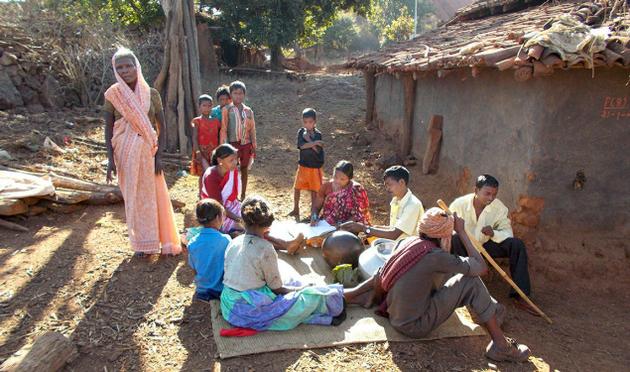
- Strong sense of community among the Tribals: From birth to death, nay even after death, a Tribal is valued on the basis of and to the extent he belongs to community. His/her entire life is directed and governed by the community s/he belongs. The social customs, taboos, traditions and practices are various means of this governance. The community head and the panchayat are structures for safeguarding of these customary and traditional values.
2. Ownership with the community: The people as well as things belong to the community. Even if some individual or a family possesses and takes care of certain things, s/he easily avails these things for the use of the community, for example, the musical instruments. Even songs and dancing steps, no matter who originates or composes them, they belong to the community. There is no patent and no authorship claim.

- Widows, orphans and handicaps are cared for:No widow, orphan or a handicap is left to fend for her/himself. There is no beggar, because the village community takes care of them.

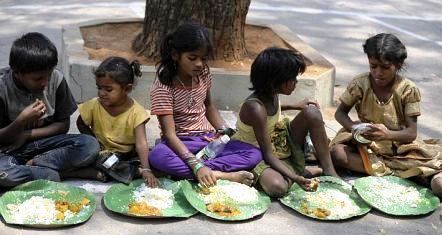
- Fruits and cereals or animals are shared:Fire is shared. Tools like grinding millstone, spade, axe, etc. are shared. Fruits, especially first fruits, are shared. Even animals are shared. Some things like bamboos, branches of a tree and manure etc. are simply made available free of cost to the neighbours.

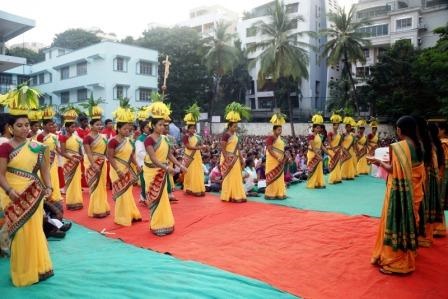

- Major events of life are always communitarian:Birth onwards many important events become occasions for community ceremonies and celebrations. Matrimony is through and through a community event, from match-making to its ultimate fruition in marriage. Even the physical preparation and the burden of feeding are shared. It is not the headache of parents or guardians of the spouses alone. The responsibility of giving a girl in marriage or bringing a wife for a son is shared by the community members. Similarly death too becomes a community celebration or observance.
Oh, what an ideal community? I dare say it is better than any community based on SCC! But wait a minute. Where is such a community today? In fact, it was a mistake that I used present tense in speaking about such a community. I should use past tense, because it is a description of a community that used to be, once upon a time, in the past. I would be delighted to find vestiges of such a community anywhere. Well, it was true of our own Chotanagpur Tribal Community. Wasn’t such a community a readymade and welcome ground for Christian way of living? Where do we find such an ideal community today? What has happened to our Chotanagpur Tribal community? Why has it lost such a wonderful ideal, in spite of Christianity? What could be done to bring it back or to improve upon our community?
This is where the point of compatibility needs to be revisited and the question of mutual fecundity to be raised again. In so doing, we hope, we will have also shown what the new way of being the Church could be and what the challenges are.
The Acts of the Apostles (2:41-47& 4:32-37) give us the picture of an ideal Christian community, which became a powerful witness to the risen Christ and a cause of attraction to many more believers towards this ideal community. The BCC or SCC took its inspiration from that early Church and proved itself relevant to certain time and place. Drawing further inspiration from it the Federation of Asian Bishops’ Conference (FABC) in its Bandung Statement in 1990 laid before us the need for “a new way of being and becoming Church”.
Already in the aforementioned Conference in Bandung several good effects and fruits of the SCC were highlighted, how the believing community grows in unity, cooperation and faith, and manifests all this in its daily life. The SCC brings about an atmosphere of fraternity and solidarity. The community as well as individuals are attracted more and more towards the Word of God; the community not only adores the Word of God, it also lives it in its actual situation. This sense of fellowship and solidarity extends even to the non-Christians, as a result an entire village or township breathes an air of peace and joy. The more human it becomes the more likely that Christ lives in that community.
If such are the fruits of the SCC, isn’t it the answer to many problems the world at large faces today? It has the potential assurance of winning peace and harmony, fraternity and solidarity; in fact, the humanity itself could be reassured. But unfortunately the world continues to struggle to maintain its humane atmosphere.Well, the world as such has many obstacles in accepting the path of the SCC. But what about the Tribal Church, which has so many agreeable points between its culture and the Christian call? Are we enjoying the fruits of the SCC in our community? Are we bearing such fruits through SCC for others to savour? In spite of such agreeable points and compatibility between the Church and our culture if we are not able to live up to the call to peace and harmony among ourselves, it signifies that we have neither maintained our cultural values nor lived our Christian call.
The following are the possible challenges and difficulties, in my opinion, we face:
1) Our attempt to adjust with modernity: Literate or semi-literate we are all trying to cope up with modernity. Modernity has many good things to contribute to our society. But it has also challenged some of our age old traditional values.
2) Entry of selfishness or individualism: With education or qualification came high salaried jobs, mostly in towns and cities. Along with this economic improvement entered surreptitiously also self-centrism or indifference, lack of concern for others.
3) Lack of proper channels for handing on of traditional values: Mother tongue gave way to other more popular languages. Some of the good code of conduct in family or community began to disappear. It’s not just the language, but somehow there is a prevalent weak parenting among our families. The children, especially the growing and grown up teenagers, are not effectively under the supervision or command of the parents. There is no “family” or togetherness in real sense of the term, in most cases.
4) Change of social organization and governance: Unlike in the past there is no longer any village head or panchayat to guide, to check and to perpetuate social norms, code of conduct and traditions. Our traditional system of having a village head and a panchayat has been eclipsed or replaced by new political organizations.
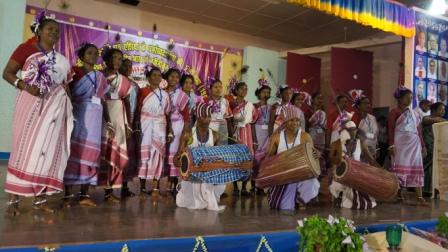


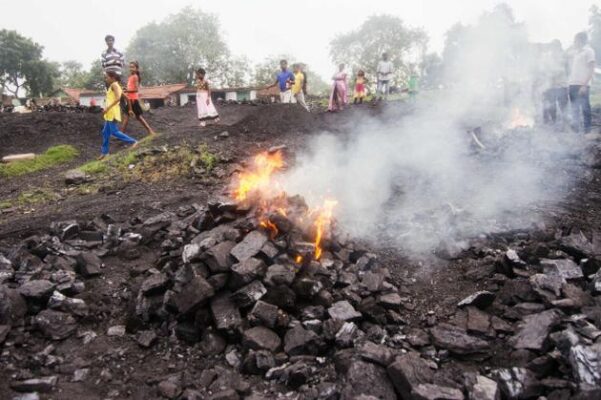
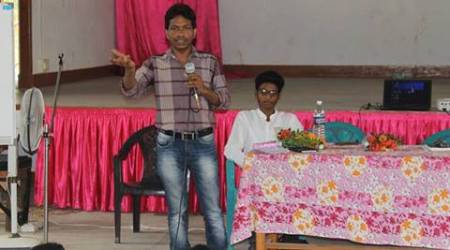

5) Migration for various reasons weakened the social strength and unity: Each one for himself and herself; even if migrated as a group in a new environment the group, worse still an individual, could not withstand the onslaught of strange cultures and traditions.Migration is mostly to towns and cities where the chances are few and far between for holding on to one’s traditions and culture no matter how rich they are or have been. Even elsewhere like tea gardens in Terai, Dooars in West Bengalor in Assam the migrated Adivasi community has lost to a great extent its rich heritage of values and traditions.
6) Education without formation: No doubt the society has developed in certain sense and in some areas thanks to education. But there are also instances today of education being cut off from character formation. Children coming out of schools and colleges are not well formed or not sufficiently formed. In some cases, even the quality of education is missing. A student may come out of a school with a certificate or a degree, but no substantial knowledge worth the trouble. Such an education has only deformed and DE capacitated our children.
7) Lack of something central and very source of nourishment: The age old traditions, code of conduct and value system required some stable and at the same time ever vibrantsource of nourishment for the rich cultural heritage to continue. Partly with Christianity and partly with modernity such a source dried up. In the absence of such a source the Tribal culture faces many different perils and has partly succumbed to them and remains ever prone to suffer extinction.
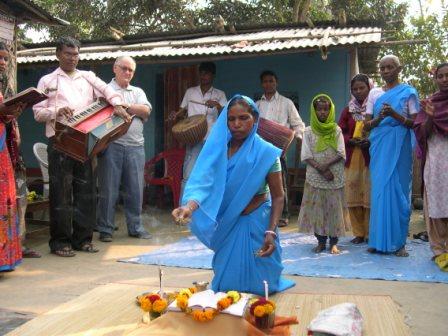
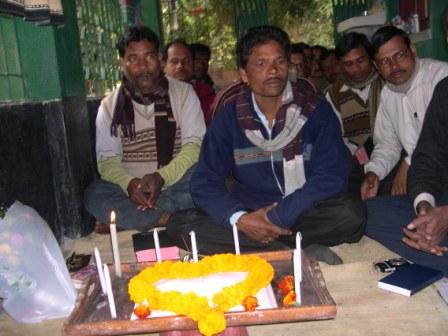
In fact, some of these above-mentioned factors are affecting also Christianity to some extent in some places; but not everywhere and not as tragically as they are doing the Tribal culture. Here is the difference and here is the clue to the question of fecundity. In the case of Christianity the never ceasing source of nourishment is the Word of God, the Bible. The Word of God is alive and active. It continues to touch the lives of many, individuals and communities. It is in this sense the SCC scores better than the Tribal community. As the source of appeal, the source of inspiration and the source of continual support or nourishment the Word of God is the reason why the SCC can not only save Christianity, nay humanity; it can also in turn save the Tribal community. It can save the Tribal community because of the fact of its compatibility with Christianity. The Word of God can save a family; it can rebuild a broken or breaking family; it has the potency to reconcile the divisions and hatred. The Word of God can also inspire and remind the humane and Christian part of a person. It can alert and protect from dangers from without as well as from within. The Word of God can bridge the gap between a Tribal and a non-Tribal, between a Christian and a non-Christian. The Word of God can respect and honour the uniqueness as well as differences of a person and at the same time can build a harmonious mosaic of a society.
In contrast, looking at the past, the Tribal Community looked at others, especially the non-Tribals as “dikkus”, a term which signified not just the fact of being a stranger, not-one-of-us, but almost the fact of considering him/her an intruder, enemy or trouble shooter! Exclusivity was stronger than inclusivity.
In today’s globalized society no ghetto can survive. Exclusivism is not the right mode of behaviour. To an extent even our traditional community used to accept non-tribals like blacksmith, petty business men, and so on. Christianity and proper education should and do open the frontiers for accepting many non-tribals in their own specificity and uniqueness. The SCC promotes precisely such positive and community-building approaches.
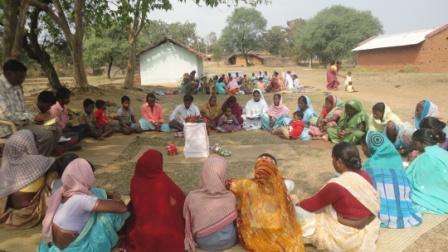

The SCC is based on and centralized on the Word of God. Although each place has developed some variations of their own, the small Christian Communities have the same essential factors in common:
1/ They meet together with the power of the Word of God: In small Christian Communities the Word of God is always in the centre. Christ is the Word of God incarnated into the world. Therefore wherever Christians meet together, the Word of God should take first and central place. Listening to the Word of God, sharing their experiences, the people of God mature as children of God and they develop an evangelical perspective to see, discern and judge the complex realities of our world. This realizes the teaching of Dei Verbum.
2/ They meet in small groups: Community building is not possible in a large mass. But in the small Christian communities the Christians have close contacts with a limited number of members and feel the bond of community life having a new sense of belonging and solidarity based on a common faith. This is what Lumen Gentium teaches and wishes us to realise.
3/ They pray together in communion with the Universal Church: While the majority of Christians find it difficult to pray individually in their ordinary lives, the small Christian Community helps people grow together in their spiritual life praying together regularly, following the liturgical calendar of the Universal Church. In small Christian communities the members are deeply influenced in their spiritual life by others in the community through the sharing of experiences lived in daily life. The small communities present the milieu for a communitarian spirituality. This is what Sacrosanctum Concilium also tells us to achieve.
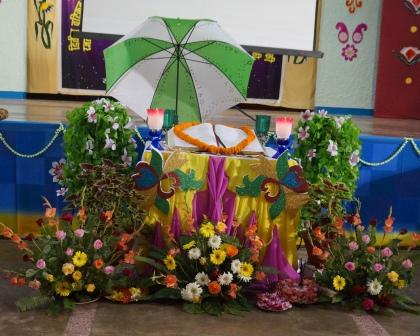
4/ They realize the Gospel in their lives: The small Christian Communities try to put into practice the Word of God in their concrete daily lives. There are several methods of sharing the Gospels but they all aim not only to meditate on the Word of God but also to live out in their daily life the knowledge they received from the Gospel so that they could contribute towards realizing the Kingdom of God in this world. The small Christian Communities put us within a powerful context in order to challenge unjust realities in modern society so that we could transform the world into the Kingdom of God which Jesus wished to accomplish. This realizes the teaching of GaudiumetSpes.
Conclusion
The Holy Spirit has always intervened and inspired right from the beginning of the early Church. The Lord God did not wish to call just a few chosen people but the whole of humankind to salvation and eternal life. It is God’s will that we too be saved through the structure of community. This communitarian structure of the Church existed from the beginning and survived through many centuries but flourished in modern times after the Second Vatican Council especially in the small Christian Communities. It is astounding to see that these small Christian Communities appeared simultaneously but separately in all continents without any artificial leadership of the church hierarchy. There is no motherhouse or any headquarters of small Christian Communities in the world while the movements like Legion of Mary, Focolare etc. have their own head office in some place.
The Holy Spirit, who founded the community of Apostles at the moment of Pentecost, has always accompanied the Church through the history and led the modern Church through the Second Vatican Council and is now working equally in the Small Christian Communities supporting their communitarian activities. It is indeed the work of the same Holy Spirit which once brought us Tribals into Christianity and now through the SCC provides us the means to safeguard even our Tribal values and rich traditions, especially that of our communitarian perspective of life and life-after. Therefore, we the Tribal Christians in today’s context do well by following the SCC mode of living our faith. In so doing we can also preserve some of our rich heritage. I really wonder if it is possible to safeguard our Tribal identity and culture without the help of SCC. In following the SCC ideology we are only strengthening our communitarian and other-oriented mode of life as Tribals; and not just among ourselves as Tribals but also in relation and communion with the non-Tribals as well. Summing up I can say that the SCC, if seriously or genuinely followed, in reality inculturates the community-oriented style of living of the Tribals. For the Tribals, therefore, following the SCC pattern of life should not be difficult, for it is not superimposed; rather it should be easier to follow because it is in fact re-living the rich traditions and values. The only difference is that Christianity, for that matter the SCC, provides us with a constant and never ceasing source of nourishment, namely the ever living and ever active Word of God.
11 October, 2016 (Hazaribagh) +Vincent Aind
SCC REGIONAL RESOURCE TEAM
Jharkhand-Andaman
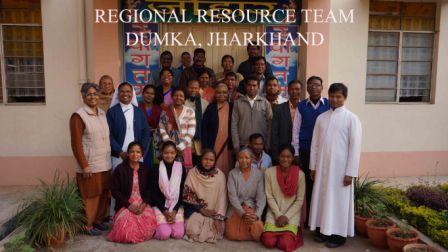
REGIONAL RESOURCE TEAM TRAINING:
SCC Regional Resource Team training for Jharkhand was conducted in SDC Dumka from 22nd to 26th November 2016. There were 26 participants from Jharkhand.
The topics dwelt with were:
- Bible Veneration, Bible enthronment
- Sharing of experiences
- Challenges faced by SCCs and our response
- Difference between crowd and group; group and community
- Tribal life, characteristics, culture and first Christian communities
- DIIPA Introductory workshop – the Methods of Bible enthronement & veneration
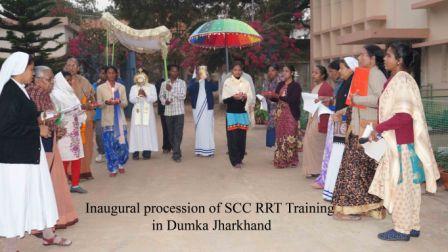
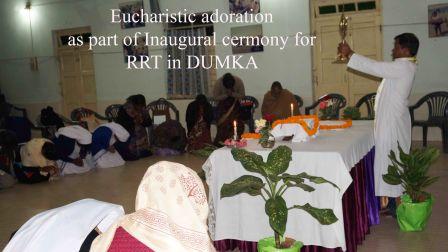

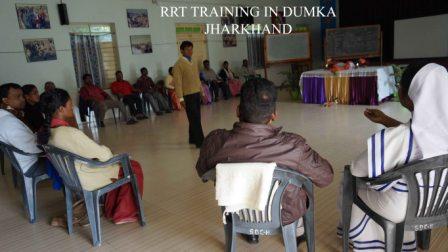
Section I: Basic knowledge of SCCs
Why we need Small Christian Communities
Five models of the Church
Four Marks of SCCs
Section II : Spirituality –7 steps Gospel Sharing
The place of Eucharist and Word of God in our lives
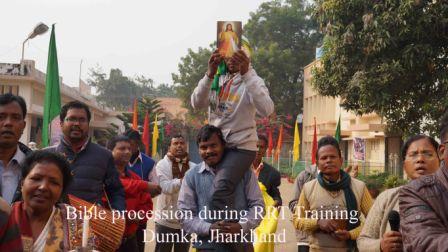

REPORT PRESENTED BY JHARKHAND REGION TO THE SCC NATION COUNCIL MEETING 2017
SCC IN TRIBAL AREA
This is a brief sharing from 45 years of studies, observation and experience of working and living with my tribal brothers and sisters in Jharkhand. The last few years were spent exclusively for promoting Small Christian Communities there.
When I first thought of introducing Small Christian Communities to the people of Jharkhand, many objections were raised. Most of these objections came from the local clergy and religious. They were of the opinion that adivasis did not need SCC as their life is already structured around small village communities. They share their life’s joys and sorrows in these communities. There they discuss problems and arrive at solutions. What more can SCCs offer to these people?
To answer this question, and to understand the need for SCCs in Jharkhand Region, we need to know the situation of the people of Jharkhand in an in-depth way.
Though we talk about Jharkhand as a tribal land, within this land there are at least four major and distinct tribes, namely, Santhal, Oraon, Munda and Kharia. Each of these tribes have their own religious and social practices: rituals, festivals, symbols and traditions. However, in spite of these differences, in almost all of these communities, we can observe the following common characteristics:
– A deep sense of the spiritual. The Adivasis have a deep awareness of God’s presence everywhere, they connect their daily life of hard work with worship, they care for all creation and they have a high standard of morality. The tribal people connect with God through worship, adoration, sacrifice and offering, prayer and penance, self purification and good work. Offering sacrifice is quite natural to them. Their spirituality is bound up with life and all that life involves; freedom and food, dignity and equality, community and sharing of resources, creativity and celebration of the God of life and liberation. Their sense of humility, simplicity, poverty, hard work, sincerity, community spirit, sharing and caring comes from this deep inner spiritual life.
– a natural sense of community living. This is shown in their work and celebrations. For a tribal the family is not simply made up of father, mother and children and grand children but also his brothers and sisters with their wives and children, his nephews and nieces, in a word, all those persons who descend from a common ancestor. In tribal society, there is no individual life as such. For example, there are no individual or single dances like in other societies. All their songs and dances are community celebrations. In addition to the above, the tribal people live, work, suffer and die in solidarity with one another. The sick in the family and the village are taken care of, the needy are helped, agricultural activities are accomplished jointly. Co-responsibility is practiced. In the tribal family all are responsible for the education of the child. The community has the right to teach, correct, reprimand and punish the child.
A Paradigm Shift! The tribal communities in India today, however, are going through rapid and radical changes. In the process of mainstreaming, many tribal people are coming under powerful non-tribal influence. There is a total cultural diffusion taking place rather than a balanced reciprocity and cultural exchanges. The new political environment tends to divide the village community on the basis of affiliation to political groups. Industrialization has brought about its own dark sides of exploitation and injustice and displacement. Their beloved “land, forest and water”, which are the soul of their very identity, are being lured away from them by unscrupulous corporate developers, with the connivance of the ruling dispensation. The people are betrayed in the name of rehabilitation, compensation and jobs. The promises were not fulfilled and the jobs were given to the outsiders.
The Adivasis are beginning to realize that their voice cannot be heard if they are divided and isolated. Efforts are being made to organize themselves in groups and discuss these pressing matters of their very survival as a people. Their determination to fight for survival is evident in these slogans that have come up: “Loha Nahi Anaj Chahiye” (We want grains not iron), “Jal, Jungle aur Jamin Hamara Hai” (Water, forest and land belong to us) and “Jan denge, Jamin Nahi Denge” (We will surrender our lives but not our land. The Adivasis now believe that they can protect their land and life only through mass struggle.
Enter SCCs! This is the situation where the movement of Small Christian Communities takes on special relevance to the Tribal Communities. SCCs and tribal communities of Jharkhand are not only seen as compatible, but there are many aspects of both that can be underlined as parallel and complementary. The SCCs build on the innate ‘community culture’ of the tribals, but go beyond it, to the ‘Gospel Culture’. The introduction of the Gospel or the Word of God into the community sharing of the tribals brings about a qualitative difference to these sharings. The gospel shared and lived in the SCCs creates confidence in the tribal people’s mind and heart to rebuild their disintegrating community and their identity as a people. The Gospel encounter helps to develop a new awareness of themselves and their culture.
The SCC Jharkhand Regional Coordinator, Fr. Christopher Hembrom says, “ SCCs have brought awareness of our own identity as Santal Christian community in the Neighbourhood. Though we come together before important events and celebrations as a village community, SCCs have brought more togetherness as we now come more regularly, i.e. twice in a month, for Gospel sharing…Though traditionally we are known for our collective decision making in the village; SCCs have helped us to make a collective decision guided by the Word of God. This happens on the sixth step of our Gospel sharing when we translate the Word of God into life.”
Mr. Jerome Tudu, one of the SCC animators, says, “ In this modern age of technology and modernity our families and communities are disintegrating and losing our culture of community life. Individualism is taking over. In this situation SCCs are helping us to come back to the root as a people and as Church communities. SCCs only can save us from extinction.” Mrs. Kiran Ekka, an active SCC animator and a Government employee, thinks that SCCs have brought tremendous awareness of our responsibility towards one another in the present situation of Jharkhand. Slowly the division in the tribal community is being bridged; SCC members reach out to members of other faith communities.
Most Rev. Vincent Aind, Bishop of Bagdogra, said during the Review Seminar of SCC in the Tribal area: “In the case of Christianity the never ending source of nourishment is the Word of God. The Word of God is active and alive. It continues to touch the lives of many, individuals and communities. It is in this sense that the SCC scores better than the tribal community. As the source of appeal, the source of inspiration and the source of continual support or nourishment the Word of God is the reason why SCC can not only save Christianity, nay humanity; it can also in turn save the Tribal community” from their present problems.
For this to happen, the SCCs themselves should take up the challenge of shedding their image of being “foreign implants” and become communities which feel at home, and which are accepted by the other communities in the neighborhood. In working with the tribal communities of Jharkhand an attitude of listening and being with the community is very much needed. Only such an attitude can bring about an experience of the Church as a communion where all members are called to participation and co-responsibility.
This is also where the Church will be inculturated in the life of the tribal people of Jharkhand. The process of inculturation starts at the grassroots level, in a constant dialogue of life with people, their religions, cultures, and practices. Here the SCCs would surely need the help of experts in the sciences of theology, ethnology, anthropology, etc. to discern the compatibility of the processes and end results with the teachings and the living Tradition of the Church.
This is never a finished product, but a never-ending process. It means that the Gospel is encountering a living group of people in every moment of its life and its struggles. The significance and importance of SCC lies in the fact that all the members of such a community are involved in building the church, realizing it in their concrete life-situations.
The SCC animators and Coordinators and their trainers are called upon to be always aware of the rich tribal spirituality and culture. They are urged to protect the rich heritage of the people and to help people to face life and their struggles in the light of the Gospel. These struggles are enormous: against land grabbing, displacement, unjust modern development processes, exploitation and injustice. But the Word of God is the only power that can “save the Tribal community”.
The challenge for SCCs in the ‘neighbourhood churches´- and, for that matter, for the church in India, – is to develop a unique form of Christian living of the Gospel and of being church. This will be a wonderful contribution towards a true universality of the Christian faith in a communion of Communities, living different forms of Christian life in “unity in diversity.” Being in the service of justice, liberation, and emancipation, and community building, is one of the foremost challenges to SCC animators in Jharkhand. Based on a deeper understanding of the mystery of the incarnation, SCC animators are challenged to express Christ’s identification with the least and downtrodden, in the service of justice. This is what the SCCs propose to offer.
“He who has an ear, let him hear what the Spirit says to the churches” (Rev 2:7). To respond to the challenges posed by the political, economic, social, religious, and cultural situation within Asian societies, the bishops, priests, religious, and lay people have to discern the “signs of the times” and interpret them in the light of the gospel.” This task implies that the Church “recognize and understand the world in which we live, its expectations, its longings, and its often dramatic characteristics” (GS 4).
Sr. Christin, H.C
Sisters of Mercy of the Holy Cross,
NST Member represents NST in Jharkhand
RRT TRAINING PROGRAMME IN JARKHAND REGION
The NST conducted a five-day RRT Training programme in Dumka from the 24th to the 30th of April, 2017. The Resource persons were Rt. Rev. Ignatius Mascarenhas (Bishop of Simla- Chandigarh) and Sr. Christin Joseph, H.C. The training was based on the DIIPA Introductory workshop. Each day began with Bible Veneration and Gospel Sharing. The Training focused on Animation skills and leadership in SCC. During the Training programme, Teams were set up to go to SCCs in different parishes for field work i.e. for conducting sessions on “Guiding Leadership”. The RRT members spent four hours in the villages with SCCs. They were mutually enriched. The RRT trainees enjoyed the DIIPA Methodology and feel comfortable to use it in their own turn. The RRT members will be conducting the same sessions on leadership in SCCs for all the SCCs in the Region by training the teams of animators in diocesan and parish levels. The presence of the National Chairman, Rt. Rev. Ignatius Mascarenhas, was greatly appreciated.
RRT TRAINING CONDUCTED IN KHUNTI
The Second RRt training for Jharkhand Region was conducted in Khunti from 19th to 25th September 2017. The Main Resource persn was Sr. Christin, H.C, NST member linked to Jharkhand Region. The Topics taken up were “SCC Evanglizes families” and “The Prophetic Role of SCC in the present situation”, Exposure programme, and ” Awareness building in the Grass root level through SCCs”
Model session was conducted by Sr. Christin to equip the participants to conduct Awareness program in the grass root level. Participants of the RRT program as well as the participants from the SCCs of Khunti parish went back highly motivated.
SCC REGIONAL COUNCIL MEETING
SCC Regional Council meeting was held in SDC, Dumka from 19th to 23rd October 2017.
The main theme was “ACCOMPANYING YOUTH”. There were 120 Participants. Youth were specially invited to join the Council meeting, Keeping in mind the Synod of 2018. Some 50 young people from around the Region attended the Regional Council meeting, as well as SCC animators and pastoral workers.
Fr. Emmaunel Marandi the youth Coordinator of Dumka Diocese gave the key note address and introduced the theme to the participants.
Fr. Rajesh discussed with youth about the qualities,values, dreams, and problems of youth on the first day.
Second day Sister Christin introduced the theme of the 15th Ordinary Synod of Bishops. Sr. Christin shared with the participants that the preparations for the 15th Ordinary Synod of Bishops to take place in October 2018 has begun. In January, the Vatican made a formal announcement of the convening in October 2018 of a synod of bishops from across the world on the subject of “Youth, Faith, and Vocational Discernment”. Those 16-35 years old are considered to be “Youth”. But it needs to be adapted to local circumstances. The emphasis of the preparatory document is what youth themselves are experiencing in the modern world and what they themselves can do about it. Youth themselves are “agents of change;” many are “major, leading characters” in today’s climate of change and involvement. “The Church is called to learn from young people” as many young saints provide both “testimony” and “inspiration”.
Pope Francis and his approach
The preparatory document announces at the start “a new approach” for the Church concerning youth. That new approach is the approach of Pope Francis: “the Church, beginning with her Pastors, is called to make a self-examination and to re-discover her vocation of caring for others in the manner recommended by Pope Francis at the beginning of his pontificate.” It is said that “older approaches no long work and the experience passed on by previous generations quickly becomes obsolete.” What is deficient is “a complacent pastoral attitude” that says “we have always done it this way.”
Following the introduction, there is a short section on the beloved disciple, the Apostle John, who is presented as “both an example of a young person who chooses to follow Jesus and ‘the disciple Jesus loved’.”
The preparatory document is divided into three parts. The first part is entitled “Young People in Today’s World” and is said to be “the result of research in the social sphere” and “of studies conducted at the international level.
Youth are said to live in a “rapidly changing world” which is “different from that of their parents and educators.” They look at life as a series of “options which can be always reversed” rather than as leading to certain “definitive choices. There several other accurate but obvious points about the contemporary world, as for example, how “a hyper-connected generation” is involves in “a rapid process of change and transformation
About “discernment,” the subject of the second part, the preparatory document quotes Francis’ 2013 Evangelii gaudium, which states that discerning it should be done by recognizing, interpreting, and choosing. “Recognizing” means understanding how experience affects the interior life. Not the life of the spirit, but “desires, feelings, and emotions.” At this stage, it is said, the Word of God is of prime importance because meditating on it can mobilize the passions and make the passions emerge. “Interpreting” means understanding “what the Spirit is calling the person to do through what the Spirit stirs up in each” person. It includes the Word of God and “the moral demands of the Christian life.” “Choosing” places great emphasis on the individual and singular aspect of making the choice. The individual’s conscience is “inviolable.” “Forces outside oneself” and “practices of the past” are specifically criticized.
This second part contains a most emphatic section on Pope Francis’ “accompaniment.” “The ideal profile of the person accompanying a young person is said to be, citing the Gospels of Luke and John, a person of a “loving look . . . authoritative word . . . [being a] neighbor . . . walk[ing] with . . . an authentic witness.” Such a person “collaborates” with young people rather than attempting “to take control of their faith.” Accompaniment is said to be “the Church’s spiritual tradition,” but no references to or backgrounds of that tradition are cited. By contrast the pope had rather strongly implied in Evangelii Gaudiam (169) that accompaniment was new, for “everyone – priests, religious, and laity” in the Church, he said there, had to be “initiated” into the “art of accompaniment.”
The themes of the third part, on pastoral activity, are also from Francis’ Evangelii gaudium. Three factors are said to guide the new “pastoral style:” going out, seeing, and calling. The first is for the purpose of having “young people . . . be leading characters in their own lives.” To accomplish that, “rigid” and “outdated” attitudes of the Church must be given up. The second, “seeing,” means peering into the depths of the heart “without being intrusive or threatening.” To “see,” a pastor must begin “by setting aside [his] own mental framework.” The third, “calling,” means going on a journey with the Gospel “asking questions that have no ready-made answers” and “not by passively respecting norms.”
Scripture, conscience, and “people of reference” “the Bible has numerous accounts of young people receiving a call and their making a response like Samuel, David, and Jeremiah. And when the Lord calls Jeremiah in his thirteenth year, Jeremiah protests that he is “only a youth,” but the Lord says that he will put His own words in Jeremiah’s mouth. (Jer. 1:6-9). The Apostle Paul tells Timothy, his son in the faith, to let “no one despise your youth,” he also instructs him to be an example of faith, love, and purity (1 Tim 4:12), and strongly exhorts him to “shun youthful passions and aim at righteousness, faith, love, and peace” (2 Tim 2:22).
The document, we are told that youth “would like the Church to be closer to people and more attentive to social issues.” The Church must go beyond “a preconceived framework.” “Rigid attitudes” must be abandoned. The Church must give up any “way of acting” that is “out-dated.” The Church must not treat young people as “objects;” they are “agents.” Pastoral activity must not “dominate spaces” and should become “less standardized” and “more attentive to the individuality of each person.” “Gender” is mentioned as a determinant of different, masculine and feminine, “perceptions of reality,” but gender is also accused of being “the basis of various forms of domination, exclusion and discrimination, which all societies need to overcome.”
The document says “various research studies” show that youth need “people of reference,” who are said to be “those able to express empathy and offer them support, encouragement and help in recognizing their limit, but without making them feel they are being judged.” These reference people can be peers as well as adults. They can also be parents whose role is “crucial yet sometime problematic.” Parents have “irreplaceable educational role,” but they often “underestimate” and emphasize the “weaknesses” of their children and can be “overprotective” and lacking in “a clear idea of how to help young people focus on the future.” Reference is made to Chapter Seven of Amoris Laetitia, wherein the pope states the same kinds of criticisms of parents. There, parents are told that “obsession” is “not education.” Parents should not be “domineering.” Children should be taught “inductively” rather than by the imposition of “absolute and unquestionable truths.” In “proposing values” to children, “the valuable contributions of psychology and the educational sciences” are needed.
The participnats were also given a model SCC meeting.
The Youth participated in a SCC action song cpmetion as well as a drawing competition on “My dream Church”.
Mission in Communion Programme of Jharkhand and W.Bengal-Sikkim Regions
Regional Resource Team members of SCCs from Jharkhand, Sikkim and West Bengal had a very fruitful Mission in Communion programme; forty five SCC animators including Bishops Anand Jojo of Hazaribag and Vincent Aind of Bagdogra with priests, religious and lay leaders from 14 dioceses attended Mission in Communion from Jan 21 to 23, 2020 at Dishari, Baruipur Diocesan Pastoral center. The inaugural Bible enthronement was integrated with national flag and recitation of the preamble of the Indian Constitution. Bishop Salvadore Lobo of Baruipur welcomed the participants to his diocese and congratulated them for their works to make the Church vibrant through SCCs. Coadjutor Bishop Shymal Bose of Baruipur was also present at the inaugural session and prayed for the participants.
The participants gratefully looked at the history of SCCs in both the Regions and shared joyfully their vocation to SCCs, their success stories, challenges, and their hopes. There was also an evaluation of the SCC convention conducted in Kolkata October 2019. The Vicars General from Calcutta Fr. Dominic Gomes, Darjeeling Fr. Samuel Lepcha, Asansol Fr. IP Sarto and Raiganj Fr. Paulus Hembrum also shared about SCCs in their dioceses. They also reviewed the vision and objectives of SCCs in the dioceses.
Sr. Christin Joseph, HC, National Service Team member presented a few videos prepared by her on CAA, NRC, NPR and explained the difference between the Nationality and the Citizenship. She also highlighted the fundamental principles of our Constitution. These presentations were followed by discussion by the participants.
All unanimously decided to conscientize people on the present situation of our country by
– Sharing with all the SCCs in their regions, the information and awareness they received from the sessions
– To read and pledge to protect our Indian Constitution by reading the preamble after every Sunday Mass in the parishes
– Conducting awareness sessions in the SCCs and motivating them to share it with all their neighbours.
– pray for the nation in every SCC group and to recite the Preamble of our Constitution during the meeting.
All dioceses decided to have orientation at the diocesan level for SCC animators , youth and ParishPastoral Council members
Second day of the 3day meeting was a very special day as the sessions, Holy Eucharist, meals all were conducted in a boat in the Sundarbans. For many participants it was a first time experience and they called it as “a day out with Jesus in the boat”. The experience of communion and Mission motivated the participants to be even more committed to vocation to be SCC animators and to take forward SCCs as prophetic communities in their own regions.
